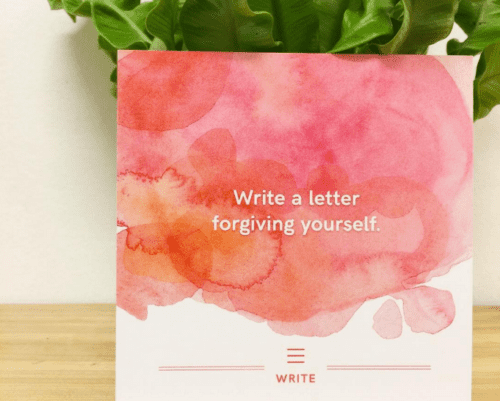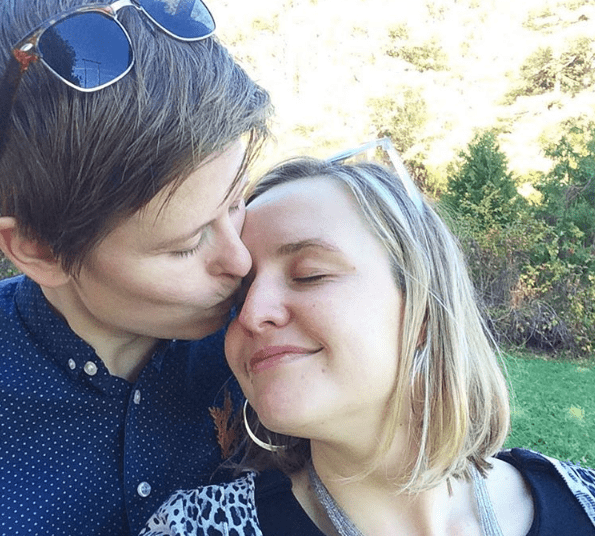Barbara Erochina wants to help free you from the critical voice inside your head. She’s on a mission to empower people with self-care; introducing a new line of Be With cards to aid in the process. These cards are designed to break the cycle of fear and indecision that can cripple your progress. We chatted with Erochina last week.
SDTC: What’s your personal story?
BE: I’m really on a mission to make all feelings okay. I immigrated to Canada from Moscow when I was ten years old, and worked really hard to assimilate. I did anything I could to fit in, from anglicizing my name to converting to evangelical Christianity as a teenager, which was only made more complicated when I came out as gay in university. I tried to be all things to all people and as a consequence my self-worth and mental health really suffered. I spent my twenties finding my way back to myself, repeatedly changing careers and intentionally unlearning patterns of putting myself last.
After using a combination of psychotherapy and coaching in order to recover from chronic depression, I blended the two to develop a new approach to coaching that focuses on emotional wellness. Through it I mobilize personal growth in my clients by teaching them the skills of self-compassion, emotional intelligence and self-care. Be With: Cards for Self-Care is actually based on my private practice with many of the prompts that appear in the deck being a living, breathing part of my practice.
Were you always this conscientious about taking care of yourself?
I thought I was, before I really understood what self-care meant. Like many women, I have internalized fat-phobia. I work pretty hard against it these days but I didn’t always. I spent a lot of my younger life believing that taking care of myself meant keeping my weight down, my hair bleached and my reputation squeaky clean enough for everyone to like me. Though breaking a sweat and getting my hair done is part of self-care these days – the impetus is different. I work out because the endorphins keep me happy, and having a nice haircut reminds me I am worth treating myself. Also, I now recognize that self-care includes things that might not be as fun like going to the dentist, and bi-weekly budgeting so I don’t freak out about finances.
When did you realize that self-care is a serious issue?
There was a real turning point in my life when I realized I was running myself ragged to take care of and control others, because I was too afraid to reckon with my own unmet needs. When I first started really checking in with myself on a daily basis, it was overwhelming. I didn’t like my job, or my relationship, or where I lived. I didn’t have healthy boundaries with my parents or my faith community. It kind of all fell apart.
That’s where transformation really happened for me – when I allowed myself enough space and time to face all that did not bring me joy, and then slowly walk away from those things trusting there must be something better in store. I used self-care, which I define as listening to and giving ourselves what we need and want, to really build my life back up, but this time in a way that made me happy and now allows me to have a much greater impact.
Is there a danger that the self-care movement may turn into self-absorption?
Yes and no. I think if we continue to buy into the lie that self-care is green juice and yoga, when what we’re actually needing and craving in the moment is chilli and a nap, we’re in serious trouble. There’s a school of self-care out there that teaches that our self-care has to look a certain way, and usually that way costs money and is only available to affluent white women. And in all honesty, that’s bullshit, and totally antithetical to what taking good care of ourselves actually means.
One of the most important parts of self-care is self-compassion, which is includes extending kindness to ourselves in response to our pain and humanity. Whenever we extend self-compassion to ourselves, we build respect to the human experience, which includes fragility and pain, as well as all the other fun stuff. And that respect is actually the birthplace of empathy, our ability to care for someone else in their suffering, to say, “Me too.” Real self-care builds our capacity to care for others, hence the popular #SelfCareIsntSelfish.

Why did you decide to go the card route for advocating better self-care?
I inherited the use of written prompts in my private practice from my own therapist. At the end of most sessions, she’d get me to jot down a note to myself on the back of a business card – an affirmation or a question, something for me to work with for the week. As I incorporated the tool into my own practice, I noticed my client and I were co-creating the same prompts over and over again.
Most of us need the same things: to be reminded that we are enough, permission to take a break, a reminder to slow down and check in with how we feel, etc. I’d always loved paper goods, and with my background in creative writing, cards just made the most sense. I’ve been asked if I’m going to be making the deck into an app, but at this point I think I’d be more likely to create a series of paper goods. I also think it’s so great for all of us to get off our tech regularly. I may be tied to my computer a lot of the time, but I know if I really need to slow down, having screen-free time is usually the answer.
What has been the biggest lesson you’ve learned in all of this?
That I can trust my intuition 100% of the time. Literally, for every single thing. Whether that goes for big picture questions like whom I work with, to the small ones like when I should break to have a snack. I’ve always heard my intuition pretty clearly, but in the past I prioritized rational thinking over it. Because what if it led me astray? What if I said no an opportunity that didn’t feel quite right but nothing that good ever came up again? I realized, a lot of the time that kind of thinking was driven by fear or scarcity. And one of my foundational values is sufficiency – there is always enough of what we need, enough creativity, enough connections, enough resources. I’m learning my intuition is perhaps one of the most important tools in my business, because it’s rooted in that calm, trusting, sufficient place in me. It knows what’s up, and I can trust it. I can trust myself.
What is your favourite thing to do to recharge?
Honestly? The spa. Give me an afternoon at the JCC, or Body Blitz, or even my own bathtub with some Epsom salts. I love soaking in hot water and just feeling my body become one with the element. There’s something about the feeling of weightlessness, and the heat, that just make me feel like anything is possible.
How can we beat this anxiety we’re experiencing in light of recent political events?
First, let yourself feel it. Let the sensation of it course through your body, and the hot tears come to your eyes. Release is necessary so we don’t bottle that pain up in our bodies where it will metastasize into disease, or depression or apathy. For many folks, this win is a wake up call, a painful realization that we can’t afford to be complacent, that there is still a long way to go. If you’re anxious, hit a punching bag, a pillow, an orange, let the energy of the fear actually move through the body in an active way.
Then, find a way to support yourself. Ask yourself, “What do I need to support myself and the (insert your emotion) I feel right now?” Do this often. Respect what you hear by giving yourself what you need. Reach out to friends and those you feel safe with, talk it out, eat well, get enough sleep. Take care of yourself, whatever that means. The best way for us to get back to action is to nourish ourselves in the moment so we feel well and supported enough to get back into the ring.



 Follow Us On Instagram
Follow Us On Instagram
